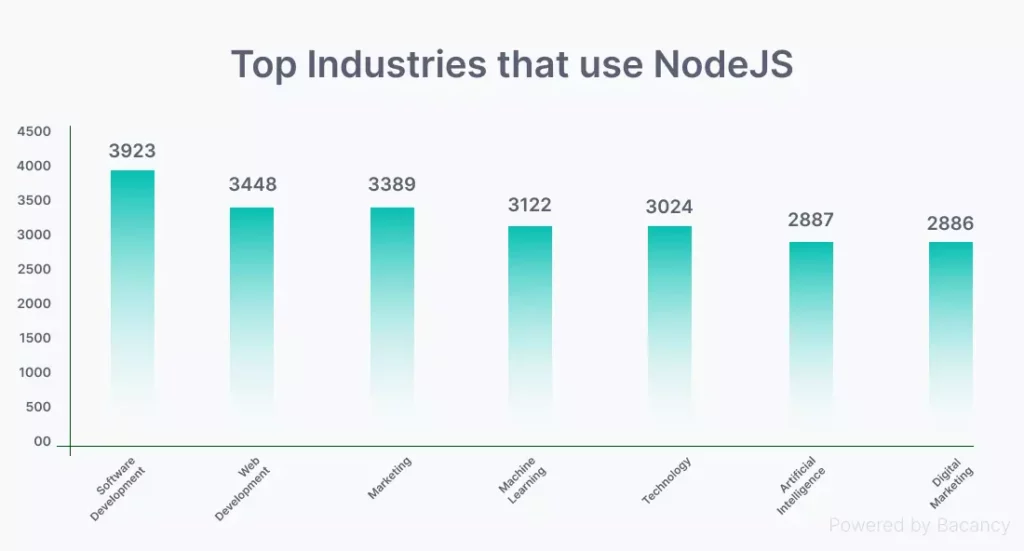As far as client-side languages go, JavaScript—and specifically Node.js—is undeniably popular among developers. As a front-end development language, JavaScript is useful for creating apps that run on several platforms.
JavaScript’s stellar reputation is largely due to its widespread use in leading platforms like Apache, NativeScript, Accelerator, Titanium, and countless more.
Nowadays, JavaScript is not only used for client-side applications but it is increasingly being used as server-side programming.
Almost every software that we use on a daily basis makes use of Node.js. Here we discuss about Node.js benefits amd how it is the backbone of many popular and widely used apps that handle massive amounts of daily traffic from all around the world. With Node.js, these applications run smoothly and without a hitch.
Understanding Node.js
Node.js is a cross-platform JavaScript runtime which is open-source that executes JavaScript code within a web browser. This powerful JavaScript runtime, built on Chrome’s V8 JavaScript engine, has revolutionised the way developers approach web application development.
Node.js boasts an event-driven, non-blocking I/O model, making it lightweight and efficient, particularly well-suited for data-intensive real-time applications that run across distributed devices. It enables JavaScript to be used for server-side scripting, and thus, allows developers to create dynamic web page content before the page is sent to the user’s web browser.
What Are The Node.js Benefits For Development
Node.js, with its unique advantages, has become a preferred environment for developers working on various web applications. Its ability to use JavaScript for both client-side and server-side scripting has revolutionised how applications are built, offering a seamless development process. Here’s a detailed look at the key advantages of using Node.js for development:
Single Programming Language Across the Stack
Unified Development Process: Node.js benefits enable the use of JavaScript for both the client-side and the server-side. This uniformity simplifies the development process, allowing developers to use a single programming language throughout the entire development stack, which can lead to increased efficiency and productivity.

Easy To Understand
Lesser Learning Curve: As one of the most widely used programming languages, JavaScript is generally well-understood among developers.
On the back end, Node.js is easy to utilise for developers who are proficient in JavaScript. In addition to being time-efficient, Node.js is also quite straightforward to learn.
Asynchronous and Event-Driven
Non-Blocking Operations: Node.js operates on a non-blocking, event-driven model. This means that operations such as I/O tasks are executed asynchronously, preventing the server from being blocked or waiting for the operation to complete. This approach significantly enhances the performance and scalability of applications, making Node.js particularly suited for data-intensive, real-time applications that require handling multiple connections simultaneously.
Fast Processing and Execution
V8 JavaScript Engine: Node.js utilises Google’s V8 JavaScript engine, which compiles JavaScript into native machine code. This compilation allows for faster execution of code, enhancing the performance of applications built on Node.js. The speed and efficiency of the V8 engine are crucial for applications that require heavy I/O operations and need to maintain high performance.
Scalability
Horizontal and Vertical Scaling: One of the standout features of Node.js is its ability to scale. Developers can scale applications in Node.js both horizontally (by adding more nodes to handle more load) and vertically (by adding additional resources). This scalability is essential for businesses that anticipate growth in user numbers and require an application that can grow seamlessly without compromising on performance.
Community Support
Active and Vibrant Community: The Node.js community is robust, active, and continuously growing. This extensive community support provides developers with access to a wealth of resources, including documentation, forums, and third-party tools. The active community also means that issues and vulnerabilities are quickly addressed, contributing to the overall security and reliability of Node.js.

Ideal for Microservices Architecture
Modularity and Flexibility: Node.js is well-suited for building applications based on the microservices architecture. Its lightweight nature and the ability to handle asynchronous calls make it ideal for creating modular and flexible applications. Microservices built with Node.js can improve the maintainability and scalability of applications, allowing businesses to evolve their technology stack more efficiently.
The Key Features of Node.js
Non-Blocking I/O Model: Node.js operates on an asynchronous, non-blocking Input/Output model, which means it can process several requests simultaneously without waiting for any to complete. This feature is particularly beneficial for applications that perform a lot of I/O operations, such as reading from or writing to the database, file system, or network connections, enabling more efficient use of resources and faster response times.
Single-Threaded but Efficient Performance: Despite being single-threaded, Node.js leverages an event loop to handle multiple connections concurrently, making it highly scalable. This design helps manage thousands of connections simultaneously without incurring the cost of thread context switching, which is common in traditional multi-threaded server environments.
Unified Development Language: Node.js allows developers to use JavaScript on both the client and server sides, enabling a more integrated and efficient development process. This uniformity simplifies the development workflow, reduces the learning curve for front-end developers to become full-stack, and facilitates code sharing and reuse.
V8 JavaScript Engine: Node.js is built on the V8 JavaScript engine developed by Google for Chrome. V8 compiles JavaScript directly into native machine code, leading to faster execution of applications. This feature, combined with Node.js’s non-blocking architecture, results in high-performance applications that can handle complex operations efficiently.
Rich Set of APIs: Node.js comes with a comprehensive set of asynchronous APIs available in its standard library, allowing developers to perform various operations such as file system I/O, network (HTTP, TCP, UDP) requests, and more without relying on external libraries. This extensive standard library significantly reduces the amount of work needed to develop complex applications.
NPM (Node Package Manager): Node.js includes access to the Node Package Manager (NPM), which houses the largest ecosystem of open-source libraries in the world. Developers can easily find packages for virtually any functionality they need, greatly accelerating development and encouraging code reuse.
Platform Agnostic Development: Node.js is cross-platform, running on Windows, macOS, Linux, and Unix, enabling developers to build and deploy applications across different environments with minimal changes. This feature simplifies development and deployment processes, making Node.js a versatile tool for a wide range of projects.

Node.js Use Cases In Different Applications
Node.js is a versatile platform that supports a wide range of applications due to its event-driven architecture, efficient performance, and extensive ecosystem. Below are key use cases where Node.js benefits has been particularly effective:
Chat Systems and Live Updates: Node.js excels in building applications that require real-time capabilities like chat applications or live content updates. It allows for handling multiple connections simultaneously, making it ideal for applications where users expect immediate communication or data updates.
Dynamic Web Applications: SPAs can load an HTML webpage and update content dynamically as the user interacts with the app. Node.js, with its fast server-side response and ability to handle asynchronous calls, provides a robust backend for SPAs, enhancing user experience with quick content loading and seamless interactions.
RESTful & GraphQL APIs: Node.js is widely used for building both RESTful and GraphQL APIs due to its ability to handle a large number of simultaneous connections with high throughput. Its efficiency in managing I/O operations makes it suitable for services that require quick data retrieval and updates, serving as a reliable backend for web and mobile applications.
Streaming Applications: Node.js’s streams module allows for processing large files or data streams efficiently, making it a good choice for applications that involve video or audio streaming. Its ability to handle data in chunks reduces overall memory consumption and enhances performance for streaming services.
Internet of Things (IoT): The lightweight and efficient nature of Node.js suits the development of IoT applications, where devices need to communicate with servers with minimal latency. Node.js can handle multiple device connections, making it capable of processing and responding to a vast amount of sensor data in real-time.
Collaboration Tools: Node.js supports the development of collaboration tools where users can see real-time updates. This could include project management software, live document editing, or version control platforms, where the immediate reflection of changes for all users is crucial.
E-commerce Sites: The scalability and speed of Node.js makes it an excellent choice for e-commerce platforms that require the capability to handle spikes in traffic and transactions efficiently. Node.js can support the complex functionalities of these platforms while ensuring a smooth user experience.
Conclusion
Node.js’s suitability for various applications, from real-time chat applications to complex e-commerce platforms, highlights its flexibility and capability to meet the demands of modern web development. Its event-driven architecture ensures that applications built with Node.js can handle multiple connections efficiently, making it an ideal choice for projects that require real-time data processing and high concurrency.
As businesses continue to embrace digital transformation, the need for robust, scalable, and efficient web applications has never been greater. Whether you’re building a startup, a MVP or scaling an enterprise-grade application, Node.js provides the tools and performance needed to succeed.
Looking to leverage the advantages of Node.js for your next project?
Appscrip’s product-ready app development solutions are here to transform your vision into reality. With our expertise in Node.js and a commitment to innovation, we deliver tailor-made solutions that cater to your unique business needs.
Our team of skilled developers harnesses the power of Node.js to create applications that are not only fast and scalable but also aligned with the latest industry standards.









